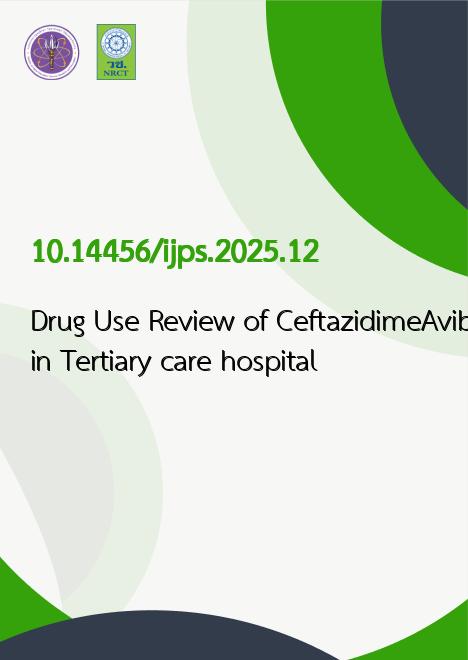
|
Drug Use Review of Ceftazidime/Avibactam in Tertiary care hospital |
|---|---|
| รหัสดีโอไอ | |
| Creator | Chuleephorn Pitayakittiwong |
| Title | Drug Use Review of Ceftazidime/Avibactam in Tertiary care hospital |
| Contributor | Jetpreeya Rungsuksai, Pimtida Ouppakoth, Atibordee Meesing, Siriluk Jaisue |
| Publisher | Faculty of Pharmaceutical Sciences KKU MSU UBU |
| Publication Year | 2568 |
| Journal Title | Isan Journal of Pharmaceutical Sciences |
| Journal Vol. | 21 |
| Journal No. | 2 |
| Page no. | 61-72 |
| Keyword | ceftazidime, avibactam, drug use review, CRE |
| URL Website | https://tci-thaijo.org/index.php/IJPS |
| Website title | Isan Journal of Pharmaceutical Sciences, IJPS |
| ISSN | 19050852 |
| Abstract | Antimicrobial resistance, particularly Carbapenem-Resistant Enterobacterales (CRE), is a growing public health concern, and rational antibiotic use may help to delay the progression. This includes the use of ceftazidime/avibactam, an effective option against CRE. Objectives: To study the use pattern of ceftazidime/avibactam in tertiary care hospital, Thailand. Methods: A retrospective observational study of adult patients receiving ceftazidime/avibactam. The compliance with indication, dosage, administration, and duration of therapy was assessed based on The Thailand Essential Drug List guideline 2022. Monitoring of efficacy and safety during the drug use were compared with the criteria developed in this study. Treatment outcomes at the end of therapy was also studied. Results: There were 148 treatment episodes (n) of ceftazidime/avibactam in 134 patients (N) during the study period. Most of them were critically ill (99 patients, 66.9% (n)) and admitted to medicine wards (100 patients, 67.6% (n)). The most common indications were bacteremia (58 treatment episodes, 33.5%). The majority of causative pathogens were carbapenem-resistant Klebsiella pneumoniae and Escherichia coli. The indication, dosage regimen, administration, and duration of therapy were complied with The Thailand Essential Drug List guideline 2022 in 68 treatment episodes (46%), 84 treatment episodes (56.8%), 75 treatment episodes (50.7%) and 94 treatment episodes (63.5%), respectively. Efficacy and safety monitoring were conducted in 138 treatment episodes (93.2%) and 141 treatment episodes (95.3%), respectively. Treatment outcomes showed that 77 patients (n, 52%) were cured. Conclusion: Ceftazidime/avibactam use in this hospital showed moderate compliance with the recommendation by The Thailand Essential Drug List guideline 2022 in terms of indication, dosage, and administration, but monitoring of treatment efficacy and safety was consistently high. Most patients achieved clinical recovery. To achieve national antimicrobial resistance control, the ceftazidime/avibactam use aligning with the established guideline should be encouraged. |
